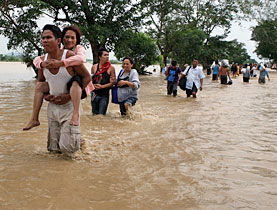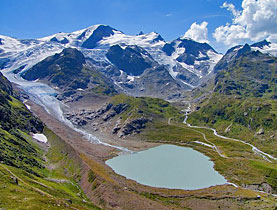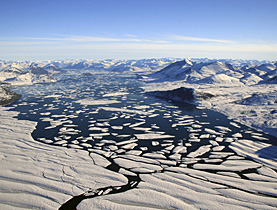Switzerland upbeat despite climate setback

Swiss government officials, environmentalists and the business community are unfazed that a legally binding treaty on the climate may not be reached in Copenhagen next month.
Their reaction comes in response to statements from leaders at an Asia Pacific Economic Cooperation (Apec) summit this weekend downplaying hopes of substantial progress at the United Nations climate conference.
United States President Barack Obama and some other Apec leaders indicated in Singapore that the meeting should aim for political agreements instead of a legally binding deal.
A climate pact to replace the Kyoto Protocol would not be possible until the middle of next year at the earliest.
Thomas Kolly of the Swiss government’s Federal Environment Office said the Apec decision and a statement from the Danish prime minister, Lars Løkke Rasmussen, did not come as a surprise.
Rasmussen said states represented at the conference should agree to key elements such as cuts in carbon dioxide emissions for industrialised countries and set clear deadlines.
“It was to be expected and we take note of it,” said Kolly who is attending a preparatory conference of environment ministers in Denmark this week.
Compromise
He is convinced that Copenhagen will strike a compromise deal which takes account of the political interests and reality.
“The Swiss government will continue to seek a legally binding accord in Copenhagen,” he said. Failing such a deal Switzerland will opt for an accord which aims for this goal, he added.
Kolly said Switzerland is at the forefront with other countries which set ambitious but realistic targets.
The government, which is still to define its mandate for the talks in Copenhagen, said Switzerland – like the European Union – was prepared to reduce greenhouse gas emissions by 30 per cent by 2020 if other industrial countries do the same.
The Swiss delegation also plans to propose the introduction of a greenhouse tax to fund projects in the developing world.
Reasons for success
Neither the Swiss branch of the environmental organisation WWF nor the Green Party said they were discouraged by the Apec decision.
“The Swiss government should not be irritated by the outcome of the Apec meeting. It must continue to push for a legally binding deal,” said Patrick Hofstetter of WWF Switzerland.
He said there were enough reasons why Copenhagen would be a success – not least because of the high level involvement of governments at the meeting and undeniable evidence of climate change.
Hofstetter is confident that many countries will remain tough and not give up demands for ambitious goals at the UN meeting, in particular African and Pacific Ocean countries as well as some industrialised nations.
“Copenhagen is not dead,” he said.
Ambition
It is a view shared by Franziska Teuscher of the Green Party. “The summit will be a success and no country must shirk its responsibilities.”
The Greens regret the Apec could not commit itself to compulsory objectives. It is not a very promising sign that these countries failed to agree, according to Teuscher.
“We want the Swiss government to show more enthusiasm for the Copenhagen meeting. Even for a small country like Switzerland it would be possible to set ambitious aims and to show how they can be achieved,” she said.
Teuscher says she remains hopeful that enough progress can be made to pave the way for a legally binding deal at a meeting in Mexico next spring.
Swiss environmentalists insist on a 40 per cent reduction in greenhouse gas emissions compared with 1990 levels, and want the government to contribute SFr1.7 billion ($1.69 billion) to a global climate fund.
Voluntary measures
The Swiss Business Federation is not enthused by the government’s environmental targets. Instead the federation wants to focus on voluntary measures by the industry. It makes no sense to aim too high, according to the federation’s Urs Näf.
He says the outcome of the Apec meeting was to be expected as the US Senate is due to debate its new environmental policy only early next year. “The decision by Apec takes off pressure. Switzerland has more time to examine ways of implementing internationally agreed measures,” Näf said.
The government should work towards a 20 per cent reduction in carbon dioxide emissions at Copenhagen, he added.
Urs Geiser, swissinfo.ch
Intergovernmental Panel on Climate Change (IPCC) figures suggest that to have a reasonable chance of avoiding 2°C, global emissions would need to peak and start to decline within about 15-20 years.
The IPCC says industrialised countries should reduce their emissions by 25%-40% by 2020 compared with 1990 levels. It urges rich nations to reduce greenhouse gases by 80%-95% by 2050 and for developing countries to reduce their emissions by 50%.
The Swiss government proposes a 20% reduction by 2020 compared with 1990 levels. It says it is ready to raise the objective to 30%, depending on the outcome of the Copenhagen talks.
The first UN climate conference, popularly known as the Earth Summit, was held in Rio de Janeiro in 1992. It produced an international environmental treaty, the Framework Convention on Climate Change.
A follow-up conference in Kyoto, Japan, in 1997 produced the Kyoto Protocol, with binding commitments to reduce greenhouse gases. The 178-nation accord is a 1997 annexe to the 1992 treaty that requires 37 industrial nations to reduce greenhouse gas emissions by an average of 5% below 1990 levels by 2010.
The UN Climate Change Conference in Copenhagen from December 7-18, 2009 is expected to lead to a post-Kyoto climate agreement. Negotiations will focus on reducing human causes of climate change (mitigation) and adaptation as well as the needs of developing countries (financial, technological, institutional).
The Kyoto Protocol’s targets for reducing emissions apply only to a small set of countries and expire in 2012. Governments want a new treaty that is bigger, bolder, wider-ranging and more sophisticated than the Kyoto agreement.
In June, the G8 and a number of large developing countries agreed that the average temperature rise since pre-industrial times should be limited to 2°C.

In compliance with the JTI standards
More: SWI swissinfo.ch certified by the Journalism Trust Initiative





You can find an overview of ongoing debates with our journalists here. Please join us!
If you want to start a conversation about a topic raised in this article or want to report factual errors, email us at english@swissinfo.ch.